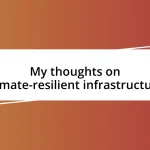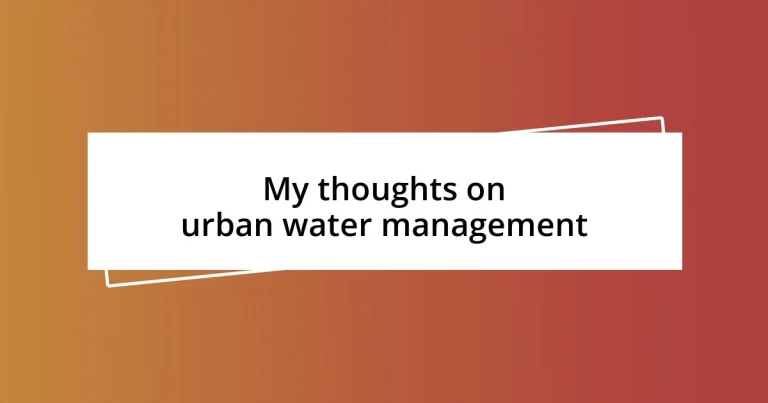Key takeaways:
- Community engagement is crucial for effective urban water management, fostering collaboration between residents and local authorities to address concerns and enhance decision-making.
- Sustainable water practices, such as rainwater harvesting and advanced purification technologies, are essential for ensuring economic stability, environmental resilience, and social cohesion.
- Innovative technologies, like IoT sensors and green infrastructure, play a significant role in improving water management efficiency and responsiveness to challenges such as climate change and infrastructure aging.
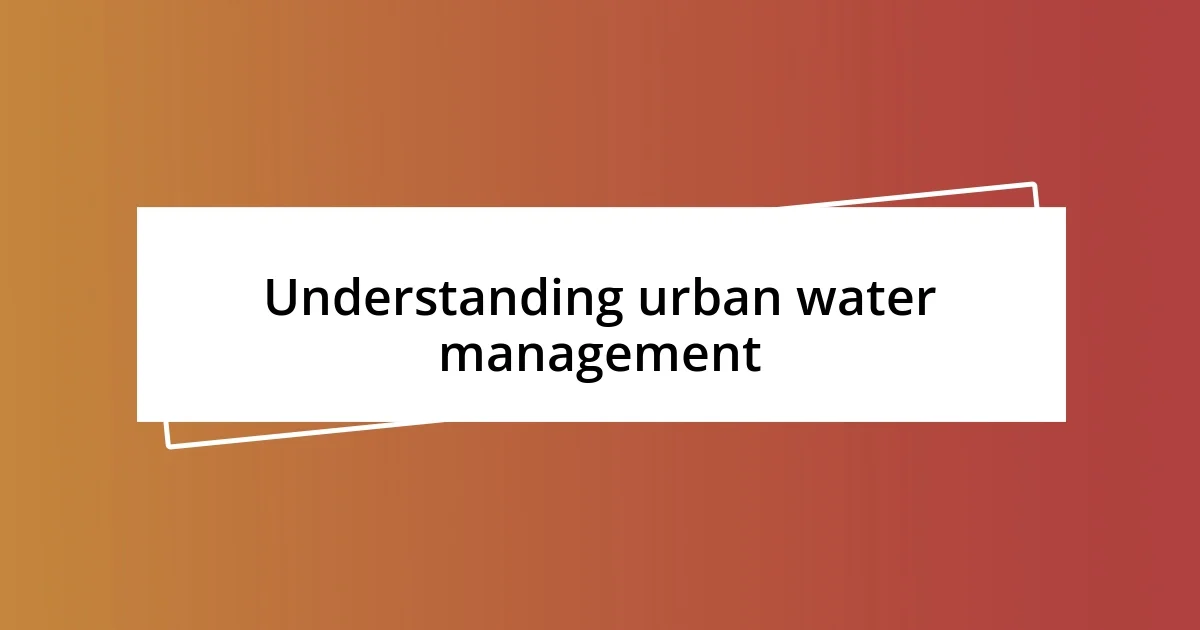
Understanding urban water management
Urban water management is an intricate dance of balancing supply and demand while preserving our precious natural resources. I often find myself reflecting on how easy it is to take access to clean water for granted until I witness communities struggling with shortages. Have you ever considered what happens when urban infrastructure fails, like during a heavy storm?
In my experience, effective urban water management isn’t just about pipes and treatment plants; it’s also about community engagement and participation. I remember a local workshop where residents shared their concerns about flooding and pollution. Their voices added depth to the planning process, reminding me that we all have a stake in our water systems. How often do we think to include diverse perspectives when discussing such crucial issues?
Moreover, the importance of sustainability in urban water management can’t be overstated. I once visited a city that implemented green roofs and rain gardens, and it was inspiring to see how they captured stormwater. It made me realize that innovative solutions are not just beneficial; they’re essential for building resilient urban spaces. What small changes can we make in our own lives to contribute to this movement?
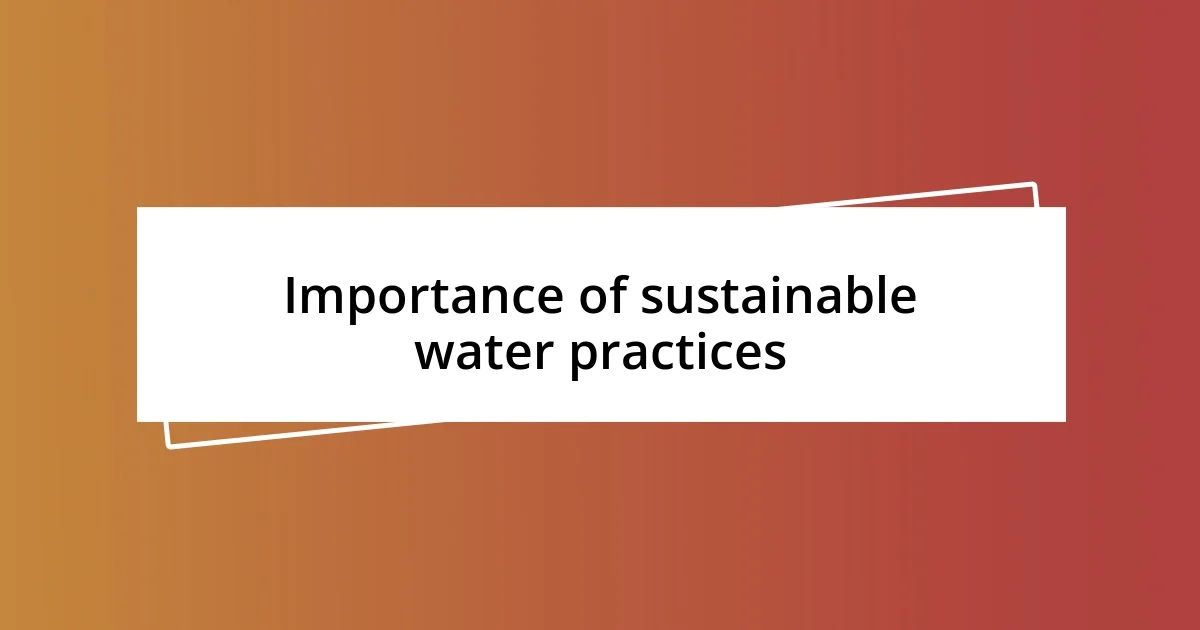
Importance of sustainable water practices
Sustainable water practices are crucial not only for the health of our communities but also for the long-term viability of our ecosystems. During a recent visit to a coastal town, I was struck by how much their economy relied on clean water for tourism and fishing. So when I saw the local efforts to purify wastewater for reuse, it made me appreciate how interconnected water management is with economic stability. Have you ever thought about the ripple effect that clean water can have on a community?
Moreover, it’s fascinating to see how every drop counts in urban settings. I recall a rainy afternoon when I learned about a neighborhood that transformed its storm drains into community gardens. This initiative not only helped with drainage but also created green spaces that fostered community pride and collaboration among residents. Isn’t it amazing how a simple change in approach can lead to both environmental resilience and social cohesion?
I believe the emotional connection people have with their water sources is often overlooked. For me, the memory of my childhood days spent splashing around in a local river reminds me of the joy clean water brings. Yet, I also recognize the urgent need to protect these valuable resources from pollution and over-extraction. Every action counts, from reducing plastic waste to advocating for better policies. Don’t you think we all have a personal responsibility to ensure clean water for future generations?
| Benefit of Sustainable Practices | Example |
|---|---|
| Economic Stability | Purifying wastewater for reuse in a coastal town |
| Environmental Resilience | Turning storm drains into community gardens |
| Social Cohesion | Community efforts in water conservation and pollution awareness |
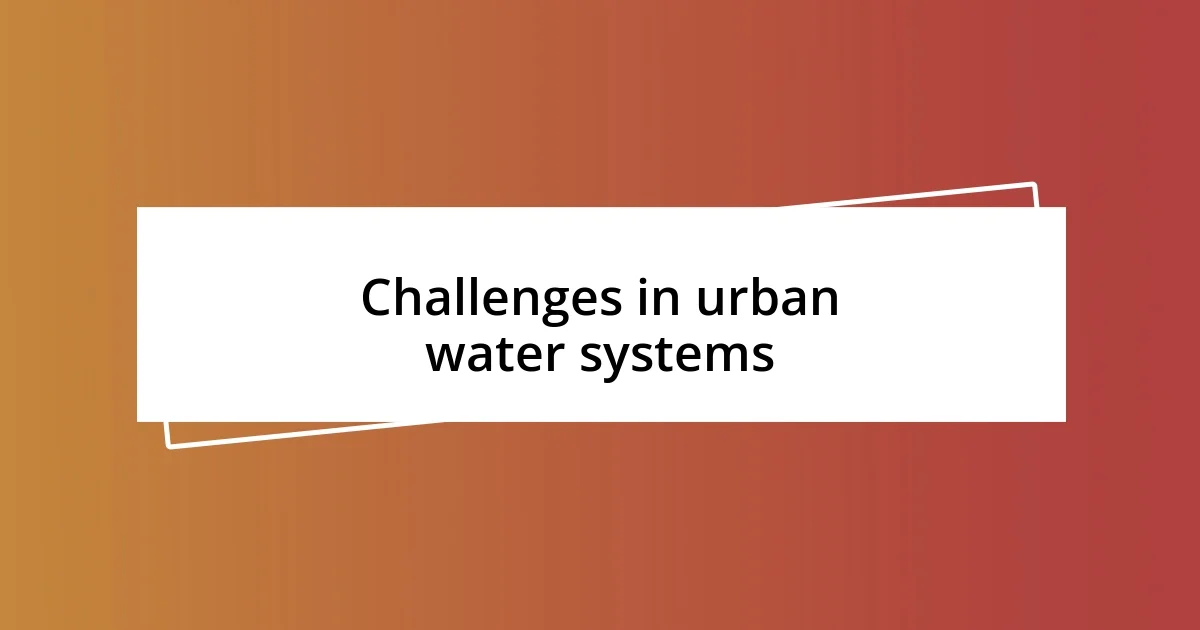
Challenges in urban water systems
Urban water systems face numerous challenges that can impact their efficiency and sustainability. For instance, aging infrastructure often leads to water leaks and system failures, creating both economic and environmental strains. I remember vividly the day our neighborhood experienced a severe water main break; it felt like chaos as residents scrambled for water. It made me ponder how many others are affected by similar issues daily.
- Aging pipes and infrastructure can cause significant water loss.
- Increased urbanization often leads to greater demand on water supplies.
- Climate change introduces unpredictability in water availability due to extreme weather events.
- Pollution threatens the quality of both surface and groundwater.
Another challenge is the mismanagement of stormwater. I once attended a community meeting where residents voiced frustrations over chronic flooding during heavy rains. It hit home for me when someone mentioned how their backyard turned into a lake after just a few hours of rain. This highlights the critical need for effective stormwater management strategies that are not just reactive, but proactive, ensuring our urban landscapes can adapt and thrive in the face of these challenges.
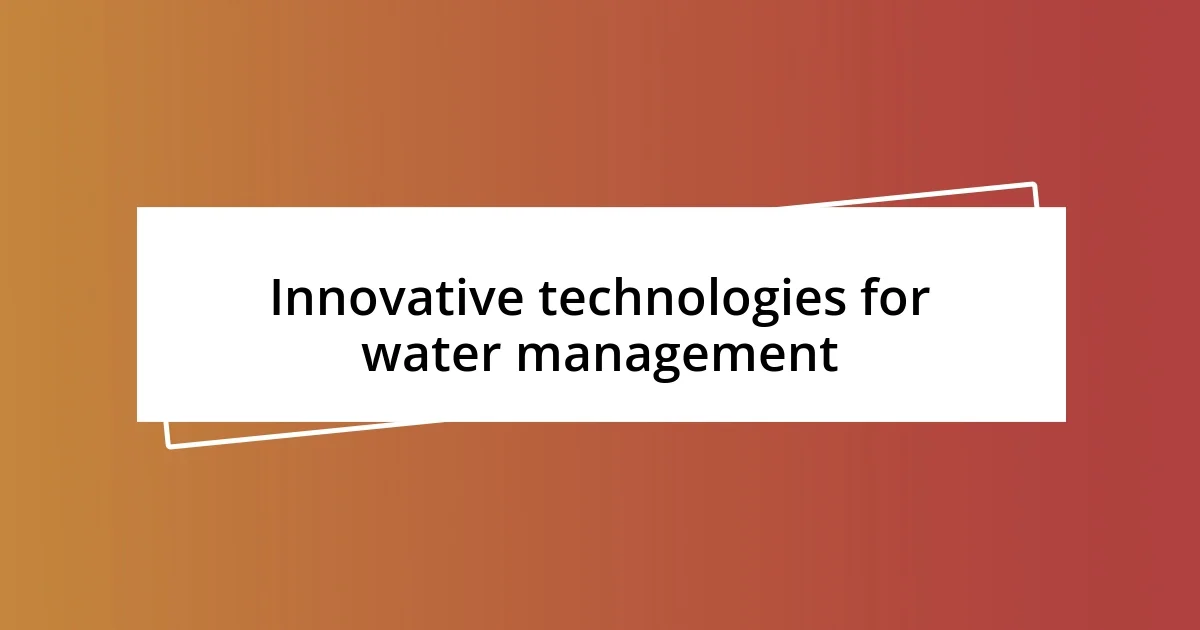
Innovative technologies for water management
One of the most exciting developments in urban water management is the rise of smart sensors. During a recent tour of a city using IoT (Internet of Things) technology, I was amazed to see how these sensors monitor water quality and usage in real-time. Can you imagine the peace of mind knowing that potential leaks or contamination issues are detected instantly? This kind of proactive monitoring not only saves resources but also offers a fast response to any water-related crises.
Another innovative approach is the integration of green infrastructure, like rain gardens and permeable pavements. I recall a project in my own neighborhood where these features were installed to manage runoff. It was incredible to see how they not only reduced flooding but also enhanced the landscape—all while providing habitats for local wildlife. Isn’t it inspiring how nature-based solutions can improve both the environment and our quality of life?
Then there’s the potential of advanced water purification technologies. I recently learned about a system that converts wastewater into potable water—a game changer in regions facing water scarcity. I remember feeling both amazed and hopeful that such innovations could secure water supplies for future generations. Have you ever considered how far we’ve come in reshaping our relationship with water through technology? The possibilities seem endless, and it’s clear that embracing these advancements can pave the way for sustainable urban living.
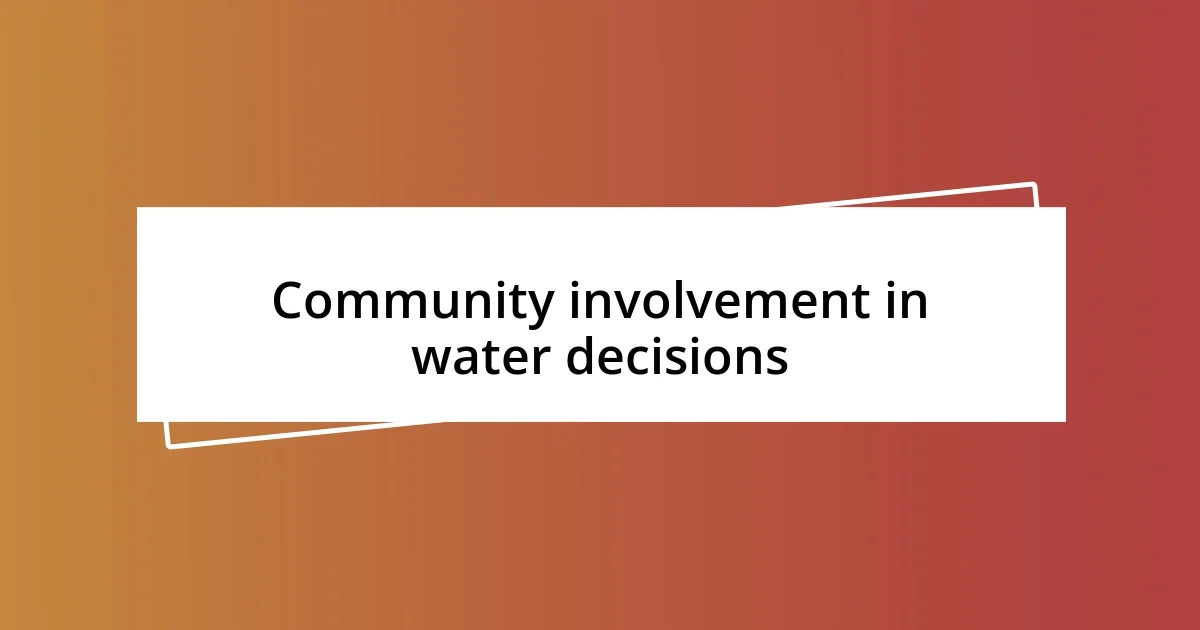
Community involvement in water decisions
Community involvement is crucial when it comes to making water-related decisions. I can still recall attending a local workshop where residents were encouraged to voice their opinions on upcoming water management plans. The energy in the room was palpable; people shared their concerns about water quality and accessibility, fostering a sense of unity and urgency. Isn’t it empowering to know that when communities come together, they can influence how their precious water resources are managed?
In my experience, collaboration between residents and local authorities often leads to better outcomes. For example, after a series of community forums, our city initiated a citizen advisory board to guide urban water policies. This not only boosted transparency but also made individuals feel heard and valued. It surprises me how much richer the conversation becomes when diverse perspectives are invited into decision-making processes. Have you ever felt a sense of ownership in projects that directly impact your daily life?
When communities take an active role, the decisions can reflect local needs more effectively. Recently, a neighbor shared how grassroots initiatives helped secure funding for a rainwater harvesting project in our area. The pride they felt in contributing to a sustainable solution was contagious. I couldn’t help but think—if we all took a page from their book, how much more resilient could our urban water systems become? The potential is enormous when community voices unite for water stewardship.
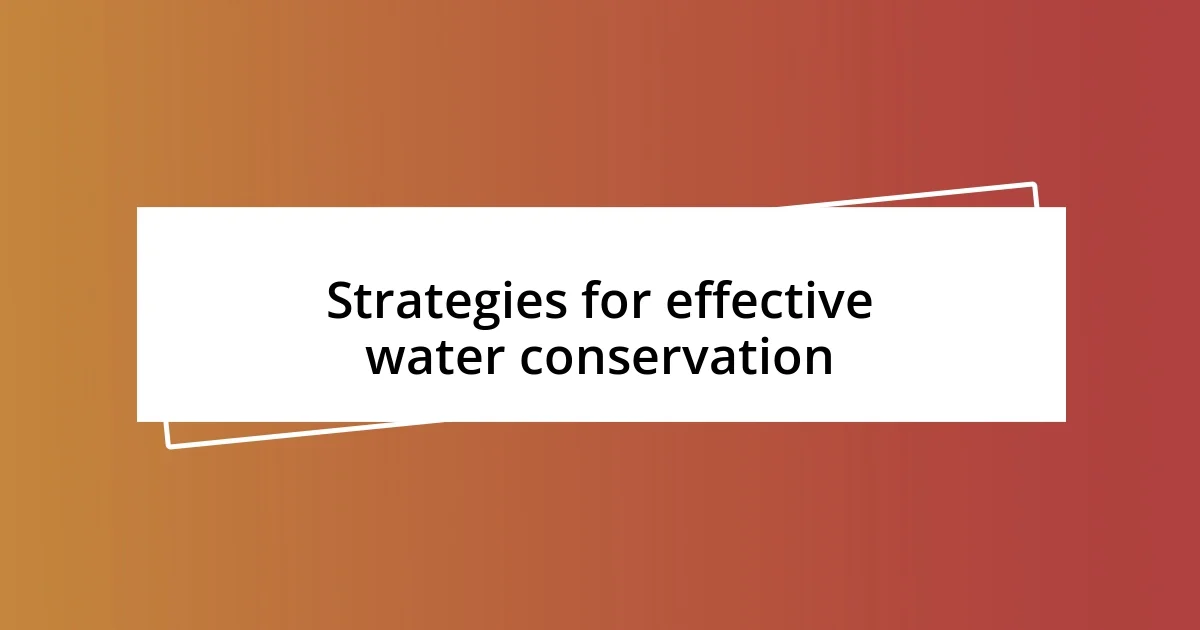
Strategies for effective water conservation
One of the most effective strategies for water conservation that often goes overlooked is the simple act of rainwater harvesting. I remember when my family installed a rain barrel during a particularly dry summer. It was surprisingly rewarding to collect rainwater for gardening, knowing we were using nature’s bounty instead of drawing from the tap. Have you ever thought about how much water you could save just by redirecting a little from your roof?
Another approach that I find inspiring is the use of water-efficient appliances. When I decided to upgrade to a low-flow showerhead, the difference was clear—not just in my water bill, but in the satisfaction of knowing I was consuming less. It really makes you reconsider daily habits, doesn’t it? The beauty of these small changes is that they add up; collectively, they can lead to significant water savings in urban settings.
Education plays a fundamental role in water conservation efforts as well. I often think back to a community seminar I attended focused on water conservation techniques. It was eye-opening to learn practical tips—like fixing leaks promptly and only running dishwashers and washing machines with full loads. The best part? Sharing these newfound insights with friends created a ripple effect, inspiring them to take part in conservation efforts too. Isn’t it amazing how knowledge can transform not just individual behaviors, but entire communities?









